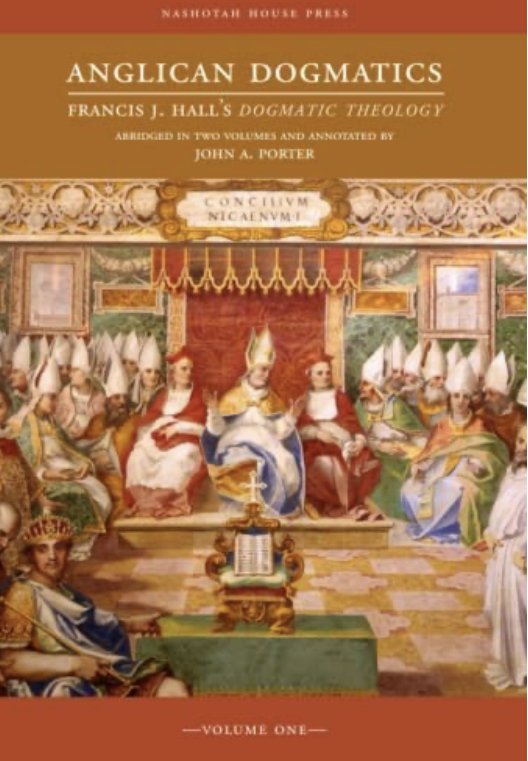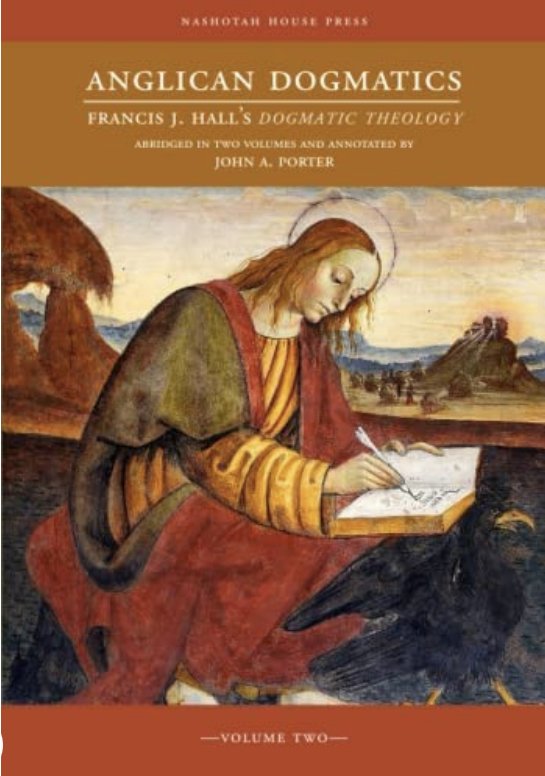Hall’s Dogmatics from Nashotah House Press
Francis J. Hall’s Ten Volume Anglican Theology
Edited by John A. Porter
A NEW RELEASE FROM NASHOTAH HOUSE PRESS:
The original advertisement for the publication of Francis J. Hall’s Dogmatic Theology in ten volumes by Longmans, Green and Company characterized it as “the long-desired Anglican Summa of doctrine, designed to constitute a connected treatment of the entire range of Catholic Doctrine,” making an implicit comparison to the magisterial Summa Theologicae (Summary of Theology) of St. Thomas Aquinas. The two are of roughly similar length, but it is in terms of comprehensiveness that the latter most resembles the former. Hall does for Anglicans what Aquinas did for Roman Catholics: systematize the contents of the Faith as taught by the Church and confirmed by the Scriptures.
Before being introduced to Dogmatic Theology, when I struggled to reply to parishioners who asked me, as their priest, what the Anglican Church taught about any number of theological questions, I attributed the difficulty to our lack of a magisterium such as that of Rome. Hall’s work, however, helped me to see what Archbishop of Canterbury Geoffrey Fisher (1887-1972) meant when he said, “We have no doctrine of our own—we only possess the Catholic doctrine of the Catholic Church,” referring to the ecumenical consensus that existed prior to the Great Schism between Greek East and Latin West in the eleventh century.
Here, indeed, is, to my mind, the best and most complete summation of that consensus, set forth magisterially between the years 1907 and 1922 by the renowned professor of dogmatics at the (then) Western Theological Seminary in Chicago, and latterly at The General Seminary in New York City.
Regrettably, this compendium of Anglican—and therefore, Catholic—doctrine is little known, and even less consulted, one hundred years after its publication.
After more than twenty years in the priesthood, I would likely never have heard of it had not an Anglo-Catholic parishioner commended it to me. Its present obscurity is no doubt due to its being out of print for long periods, as well as to the unwieldiness of its 3,198 (!) pages. This slightly abridged and fully annotated edition is intended to remove both of these obstacles to its accessibility.
My editorial work has been primarily in service of slightly condensing the original to reduce it from ten compact tomes to two full-sized volumes, a goal made attainable in large part by typesetting and formatting changes. I have omitted text only in those rare instances when I judged it to be either unnecessarily redundant, overly technical, or anachronistic in illustration or application—or when Hall enters into debate with his contemporaries on some issue of the day. In all such cases, I have used ellipses enclosed in square brackets to indicate that material is missing. Whenever sentences or paragraphs seemed to me peripheral to the flow of Hall’s argument, tangential to the subject under discussion, or parenthetical in nature, but still important enough to retain, I have converted them into smaller-print footnotes as a means of conserving space. Headings for sections (marked with §) within chapters are taken from the original table of contents for each Book, and all paragraph divisions within the sections themselves have been eliminated.
For their part, the original footnotes have been drastically reduced in number and considerably shortened in length by eliminating all references to contemporaneous theological literature, on the assumption that the large majority of those sources, whatever their historical value, are likely to be of little interest to twenty-first-century readers, especially non-specialists. On the other hand, all cross-references and all attributions to (1) theologians of the undivided Church, (2) the works of medieval authors (especially Aquinas’s Summary), and (3) post-reformational English divines (such as Richard Hooker) have been retained as essential to the Catholic character of what I have called—in venturing a distinctive title for this abridgement—“Anglican Dogmatics.”
I am grateful to the late Greg Biddle, who first brought Francis Hall’s work to my attention, and to Fr. Ben Jefferies of Nashotah House Press, who patiently facilitated this re-publication of his magnum opus. My thanks also go to Dr. Tom Holtzen for kindly penning the foreword, and to Conor McKee, who graciously provided translations of some of the more difficult Latin quotations. Needless to say, any errors are solely my responsibility.
—J. A. P.
___
Francis Joseph Hall was a prominent Episcopal theologian in America during the late nineteenth and early twentieth centuries. He was born in 1857 in Ashtabula, Ohio, and graduated from Racine College in 1882. He was ordained in 1886 and became professor of dogmatic theology at Western Seminary in Chicago, where he remained until 1913. Hall died in 1933.


